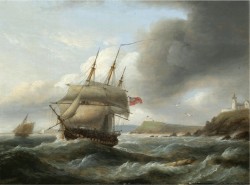Naval Officers: Self-made gentlemen

Naval service was different than the other branches of the military, and naval officers different than army officers.
The navy offered greater potential for social mobility than most institutions in Regency era society. Generally only the sons of gentlemen or perhaps wealthy middle-class parents could enter the path to becoming a naval officer, but the way was not entirely closed to others. Once a lieutenant, a man could rise through his own merit to a high position, even above those with higher origins, which was far less likely in the army.
Unlike army officers, naval officers did not purchase their commissions, they earned them. Thus, the navy offered greater potential for social mobility than most institutions in Regency era society. Boys would start in the navy as young as 12, as a midshipman, and would attach to a captain—usually a relation or family friend.
Rising in Rank

Hopefully the boy would then earn the captains good opinion and his help in attaining promotion. In order to become a lieutenant, the lowest grade of officer, a midshipman had to serve a minimum of six years at sea. On presenting himself as a candidate for commissioning, he would also be asked to show his personal log books for the ships in which he sailed. Then he would take an examination on the topics of writing, mathematics, astronomy, navigation, seamanship and gunnery. Not all midshipmen passed the test.

Midshipmen passing the examination would then have to apply for commission as a lieutenant on a specific ship. The influence of a powerful friend or family member could open the way for commissioning. If he did not receive a post on the ship he applied for, he would remain a midshipman until he once again applied for a post and received it. Many men were never commissioned. Once a man made lieutenant, the prospect of further promotion, all the way up to Admiral was possible.
Naval service was dangerous with nearly 100,000 casualties between 1793 and 1815. Surprisingly, battle at sea accounted for less than 10% of naval casualties. Accidents and disease accounted for 80%. Scurvy, caused by lack of vitamin C, tropical fevers like malaria, typhus, typhoid fever, dengue fever, yellow fever, and dysentery (the flux) took a heavy toll of sailors.
Prize Money

Naval wages, even for Captains were notoriously low. Prize money was the only way to wealth and came in various forms. If an enemy ship was sunk, ‘Head and Gun’ money (calculated by the numbers of men or guns on the enemy vessel) was awarded. Until 1808, a 3/8 share went to the captain and the remainder was divided on a diminishing scale, according to rank, among the other officers, commissioned and non-commissioned, and the ordinary members of the crew. After 1808, a slight change was made to the allocation of these shares.
If they captured an enemy ship, the Admiralty was often prepared to buy it from them and resulted in higher rewards. The best payouts came if the captured ship was carrying a valuable cargo. This kind of prize money was divided up so officers received more than the ordinary crewmen. It was possible for officers to earn substantial wealth in prize money.

Interesting but hard to imagine being on the sea and away from home years at a time. Thanks for sharing this information with us.
It is hard to imagine, isn’t it?
Thank you for that interesting information. It clears up some confusion I’ve had but never researched. I loved reading this.
So glad you enjoyed!
This post made me think of Captain Wentworth [Persuarion] as he advanced in his career and made his fortune in prize money. Wentworth’s sister was married to an Admiral. I now realize just how hard he must have worked in order to achieve that level of advancement.
Also, Henry Crawford [Mansfield Park] attempted to garner Fanny Price’s favor by helping her brother William by introducing him to his uncle the Admiral. This was the connections he needed for his advancement/promotion.
Thanks for this informative post.
I had the same sort of ah-ha’s while I was researching it all. Definitely puts things into a different perspective.
I read somewhere that it was possible for a naval officer to lose his prize money after the fact, through the prize being challenged in some way. Is that true? If so, what was the process? Who had the right to post such a challenge? I’m very curious and wish I’d kept track of the original webpage I was reading!
This is the first I’ve heard of that, so I’m afraid I can’t be of much help. I will have to check that out though–sounds very interesting!
Thanks for the information about the navy. In one or two novels, Jane marries a Fitzwilliam brother who is in the navy and earns more than 2,000 pounds a year. In fact, he was worth about 50,000 pounds in prize money. Jane had no qualms about marrying him, especially since he was more manly than Bingley and very sure of himself.
What would be considered valuable cargo? Like, is that gold and treasure chests, or would slaves be considered that as well?